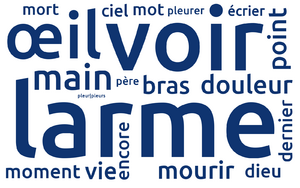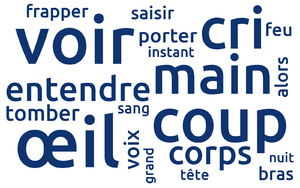Claire d’Albe (Q1099): Difference between revisions
Jump to navigation
Jump to search
(Added reference to claim: about (P36): sentiment (Q3087), Adding references Bauer-Funke_2008a Der sentimentale Roman wird beispielsweise von Mme de Souza („Adèle de Sénange", 1794) und Mme Cottin („Claire d’Albe", 1799) fortgeschrieben; Mme de Gcnlis, eine entschiedene Gegnerin der Aufklärung, setzt den historischen Roman („Les chevaliers du cygne“, 1795) fort, und auch der Schauerroman erlebt mit den Werken Ducray-Duminils („Victor ou L’enfant de la forêt“, 1796) und Révéroni Saint-Cyrs...) |
(Changed claim: about (P36): education (Q2882)) |
||||||
| (49 intermediate revisions by 2 users not shown) | |||||||
| aliases / fr / 0 | aliases / fr / 0 | ||||||
Claire d’Albe, par la C. *** | |||||||
| Property / place of publication string | |||||||
| Property / place of publication string: Maradan (français) / rank | |||||||
| Property / place of publication string: Maradan (français) / reference | |||||||
| Property / about: sentiment / reference | |||||||
| Property / about: sentiment / reference | |||||||
| Property / about: sentiment / reference | |||||||
| Property / about: sentiment / reference | |||||||
| Property / about: love / reference | |||||||
| Property / about: love / reference | |||||||
| Property / about: love / reference | |||||||
| Property / about: love / reference | |||||||
| Property / about: mourning / reference | |||||||
| Property / about: mourning / reference | |||||||
| Property / about: mourning / reference | |||||||
| Property / about: mourning / reference | |||||||
| Property / about: correspondence / reference | |||||||
| Property / about: correspondence / reference | |||||||
| Property / about: correspondence / reference | |||||||
| Property / about: correspondence / reference | |||||||
| Property / about: death / reference | |||||||
| Property / about: happiness / reference | |||||||
| Property / token count | |||||||
| |||||||
| Property / token count: 40,093 / rank | |||||||
| Property / about | |||||||
| Property / about: education / rank | |||||||
Normal rank | |||||||
| Property / about: education / reference | |||||||
| Property / about: education / reference | |||||||
| Property / about: education / reference | |||||||
| Property / about | |||||||
| Property / about: childhood / rank | |||||||
Normal rank | |||||||
| Property / about: childhood / reference | |||||||
| Property / about: childhood / reference | |||||||
| Property / about: childhood / reference | |||||||
| Property / about | |||||||
| Property / about: romantic relationship / rank | |||||||
Normal rank | |||||||
| Property / about: romantic relationship / reference | |||||||
| Property / about: romantic relationship / reference | |||||||
| Property / about: romantic relationship / reference | |||||||
| Property / language of work or name | |||||||
| Property / language of work or name: French / rank | |||||||
Normal rank | |||||||
| Property / language of work or name: French / reference | |||||||
| Property / mentioned in | |||||||
| Property / mentioned in: Bauer-Funke_1998b / rank | |||||||
Normal rank | |||||||
| Property / mentioned in: Bauer-Funke_1998b / qualifier | |||||||
occurence in text: 1
| |||||||
| Property / mentioned in: Bauer-Funke_1998b / reference | |||||||
| Property / mentioned in | |||||||
| Property / mentioned in: Bauer-Funke_2008a / rank | |||||||
Normal rank | |||||||
| Property / mentioned in: Bauer-Funke_2008a / qualifier | |||||||
occurence in text: 1
| |||||||
| Property / mentioned in: Bauer-Funke_2008a / reference | |||||||
| Property / sentiment arc diagram | |||||||
| Property / sentiment arc diagram: Cottin Claire txt distant.png / rank | |||||||
Normal rank | |||||||
| Property / sentiment arc diagram: Cottin Claire txt distant.png / reference | |||||||
| Property / token count | |||||||
40,093
| |||||||
| Property / token count: 40,093 / rank | |||||||
Normal rank | |||||||
| Property / token count: 40,093 / reference | |||||||
Latest revision as of 15:49, 15 February 2024
No description defined
| Language | Label | Description | Also known as |
|---|---|---|---|
| English | Claire d’Albe |
No description defined |
Statements
Claire d’Albe, par la C. *** (français)
1 reference
Claire d’Albe, Elise de Biré, Adolphe, Frédéric (français)
1 reference
intrigue sentimentale (une femme vertueuse éprouvée par l’amour) (français)
1 reference
analyse des sentiments, sensibilité, vertu (français)
1 reference
9 references
Der sentimentale Roman wird beispielsweise von Mme de Souza („Adèle de Sénange", 1794) und Mme Cottin („Claire d’Albe", 1799) fortgeschrieben; Mme de Gcnlis, eine entschiedene Gegnerin der Aufklärung, setzt den historischen Roman („Les chevaliers du cygne“, 1795) fort, und auch der Schauerroman erlebt mit den Werken Ducray-Duminils („Victor ou L’enfant de la forêt“, 1796) und Révéroni Saint-Cyrs („Pauliska ou La perversité moderne“, 1798) eine Kontinuität.
Wordle topic modeling 2023 topic 035 amour sentiment.png
1,600 × 1,000; 138 KB
1,600 × 1,000; 138 KB
Wordle topic modeling 2020 topic 005 amour sentiment.png
1,600 × 1,000; 139 KB
1,600 × 1,000; 139 KB
8 references
Wordle topic modeling 2023 topic 035 amour sentiment.png
1,600 × 1,000; 138 KB
1,600 × 1,000; 138 KB
Wordle topic modeling 2020 topic 005 amour sentiment.png
1,600 × 1,000; 139 KB
1,600 × 1,000; 139 KB
6 references
Wordle topic modeling 2023 topic 029 deuil.png
1,600 × 1,000; 132 KB
1,600 × 1,000; 132 KB
Wordle topic modeling 2020 topic 016 deuil.png
1,600 × 1,000; 131 KB
1,600 × 1,000; 131 KB
6 references
Wordle topic modeling 2023 topic 034 correspondance.png
1,600 × 1,000; 120 KB
1,600 × 1,000; 120 KB
Wordle topic modeling 2020 topic 011 correspondance.png
1,600 × 1,000; 142 KB
1,600 × 1,000; 142 KB
3 references
3 references
1 reference
Der Gefühlskult und das Dekor der Schauerromane verbinden sich im Briefroman Claire d'Albe (1799) von Mme Cottin.
1 reference
Der Gefühlskult und das Dekor der Schauerromane verbinden sich im Briefroman Claire d'Albe (1799) von Mme Cottin.
3 references
3 references
Cottin Claire txt distant.png
432 × 288; 37 KB
432 × 288; 37 KB










